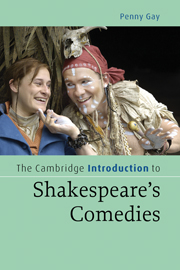Book contents
4 - Comedy and language
Published online by Cambridge University Press: 05 September 2012
Summary
Love's Labour's Lost
The ‘great feast of languages’
Plays are made of words and actions; in terms of actions, comedies, as we have seen, focus on behaviour – farcical or social – that has the potential for comic effects. What of the words that the characters speak? Late Elizabethan England was fascinated by language and its potential for persuasion, poetry, argument, and entertainment. As Shakespeare settled into his career as a playwright he took the opportunity to write a comedy that reflects almost obsessively upon the very material of his art – words and their power. Why a comedy? Language is the essence of social communication; through language we create a public identity, and attempt, using this most subtle and variable of instruments, to attain our desires. If courtship is our business, our linguistic competency is vital: ‘Listen to me, look at me, love me!’ it says. And the potential for getting it laughably wrong is immense. So, in this chapter, we will follow Shakespeare's reflections, in an almost plot-free play, on the role of language in the human community – a community that is dependent on courtship for its continuity.
In 1598 there appeared a quarto volume with this title-page: ‘A Pleasant Conceited Comedie called, Loues labors lost. As it was presented before her highnes this last Christmas. Newly corrected and augmented By W. Shakespere.
- Type
- Chapter
- Information
- The Cambridge Introduction to Shakespeare's Comedies , pp. 58 - 70Publisher: Cambridge University PressPrint publication year: 2008

